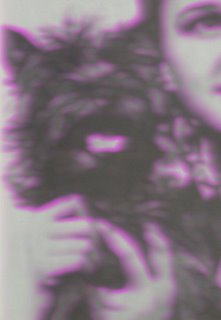Why Toto got a good shunning in Return to Oz
 You might remember the vast superiority that the film Return to Oz had over its prequel: that dark and foreboding atmosphere, all those heads, the psychedelic imagery of minerals and jewels that Dorothy cascades into at one point. You might also remember an odd absence of Dorothy’s compatriot from the first film, Toto. Not only was he missing for much of the narrative, but his role is usurped by a chicken, the irritating Billina.
You might remember the vast superiority that the film Return to Oz had over its prequel: that dark and foreboding atmosphere, all those heads, the psychedelic imagery of minerals and jewels that Dorothy cascades into at one point. You might also remember an odd absence of Dorothy’s compatriot from the first film, Toto. Not only was he missing for much of the narrative, but his role is usurped by a chicken, the irritating Billina.For those familiar with the 1939 Wizard of Oz, but not of the 1985 sequel, allow me to contextualise the quandary for a moment. The sequel has Dorothy incarcerated in a hospital, an attempt to wash her mind of the memories of Oz, and when a flood hits the environs, she gets swept back to that magical kingdom. Oz is now desolate, ruined and under the rule of a pernicious monarch, named the Nome King.
But enough of that.
Toto appears at the beginning as Dorothy loiters about the farm, daydreaming about her whacky adventures with the Scarecrow, but before any notable time lapse, she is whisked off to the hospital of psychoanalytic nightmares, leaving her sidekick by the wayside on the farm. Granted, Toto does return at the climax, but his presence is purely negligible, and is quickly replaced by a streaming consortium of end credits.
Disgraceful as this bone fide shunning was, there are nevertheless reasons for the circumvention of Toto in the film. There is, in fact, a shady and murky subterranean to this story.
First we must trace events back to 1939, the year that was to be the catalyst of Toto’s downfall. Despite critical laudation for his performance, Toto’s relations with some of the other actors were at best, strained, at worst, openly hostile. His conversations with The Tin Man would frequently descend into fisticuffs - the precarious situation made all the worst with Toto’s notorious use of profanity. Toto’s dual lusts - alcohol and women - also created tension on the film-set; often he would get liquored up in Munchkinland, then go and sleaze on the makeup assistants. His alcoholism was given little attention - most of the crew were knee-deep in whiskey - but he was lambasted for an attempted-seduction of The Wicked Witch of the West.
From the film he took a fat pay cheque, but also a placement on the blacklist. Seemed his riotous ways were not going to be accepted by the
During the interval between both Oz movies, Toto was fairly active. He took up writing, penning a number of articles for Esquire and Vanity Fair. In 1958, his first novel was published. Entitled The Furrowed Sequence, it was for the most part made up of pointless and meaningless metaphors, for instance, at one stage he uses the phrase “a plank of freckles,” at another he describes a character as “holding on to a sled of exuberance.” Castigated from all corners, the book slid into obscurity, as did Toto’s literary career in general.
The next couple of decades saw Toto marry Psych-Out’s Susan Strasberg, take up cocaine, open a chain of erotic pet shops, divorce Psych-Out’s Susan Strasberg, nearly die in a bench-press competition at a local gym, marry Straw Dogs’ Susan George, take up heroin, file for bankruptcy, divorce Straw Dogs’ Susan George, and spend two months in a coma due to an intentional drug overdose.
It was in 1984 that Toto got the call. It was the lads down at Disney. Turns out they were proposing to produce a sequel to The Wizard of Oz. Toto instantly knew to smile at that moment; the only thing good his agent ever did for him was to embed a clause in his Oz contract which stated that if a sequel were ever to be made, he would by rights have a role in it. And so, the once-shut doors of
Production began well. Cast and crew mingled favourably, no brawls had yet been reported. Toto was increasingly thankful for his second chance. However, his reasons for thankfulness were suddenly obliterated right in front of his eyes.
A freelance journalist, investigating high-level corruption in the State Department, came into contact with a confidential dossier that unveiled Toto’s grand secret in excruciatingly minute detail. Unsurprisingly, the journalist, sensing Joseph Pulitzer caressing his shoulders, went ahead and published a thorough composite of all that his research had unearthed. The next day, the headlines flashed scandal, their unambiguous words read: “Toto is a Fascist!”
The article delineated Toto’s connections to the Nazis, the subtle racism inherent in his writings, and then subsequently went on to join the lines between the Nixon administration and Toto’s unassuming, propagandistic sense of self-importance.
Sadly, so rigid was the Disney contract, that there was little the execs could do beyond demoting Toto to the bare minimum of screen time, stripping away huge portions of screenplay to reduce the role, and supplanting Toto with a chicken.


0 Comments:
Post a Comment
<< Home